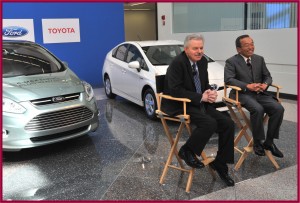
Derrick Kuzak, then Ford gvp, Global Product Development, (L) and Takeshi Uchiyamada, Toyota evp, Research & Development, sign a Memorandum of Understanding in August 2011 on a truck hybrid cooperation. The deal died less than two years later.
Toyota and Mazda have signed an agreement “to build a mutually beneficial long term partnership.” The deal includes unspecified work on environmental and advanced safety technologies.
The automotive road is littered of course with the wrecks that occurred from other such agreements couched in the same terms, including General Motors and Fiat, Ford Motor and Peugeot, Ford and Mazda, AMC and Renault, and Daimler Chrysler, to name but a few. (Ford and Toyota to Develop a New Hybrid System for Light Trucks and SUVs as well as Future Telematics Standards)
The reasons for the failure of cooperative agreements are many – a bias toward old architectures, single or limited joint ventures, different operating philosophies and systems, no true mergers, lack of trust and inequality. However, the potential savings are just too large to ignore, especially for CEOs, but not necessarily for insular middle managers and workers. Kibō (希望) springs eternal
A joint Mazda and Toyota committee will study “broad” collaboration across a range of fields. Previous cooperation between Toyota and Mazda included the licensing of Toyota’s hybrid technologies to Mazda and the production of compact cars for Toyota at Mazda’s plant in Mexico. Toyota has cooperative agreements in place with Ford Motor and BMW.
The Japanese companies –Toyota the largest and arguably most financially healthy automaker in the world, with Mazda much smaller and weaker, claimed that, “this latest agreement will go beyond the traditional framework of cooperation, aiming instead to create a whole new set of values for cars through wide-ranging medium to long-term collaboration.
The announcement comes after a lengthy discussion by FCA Chairman Sergio Marchionne during the Q1 earnings call earlier in May about the potential benefits and pitfalls of such agreements. (FCA Posts €92 million in Q1 Profit Due to North American Sales) The issue is being forced by the ongoing poor returns on investment in the auto sector compared to others even as the Great Recession recedes. Simply put the auto industry consumes far too much capital by using proprietary parts and tooling that customers cannot see, and worse, do not care about as long as the components and sub-systems are durable and easy to use.
As an example consider FCA this year, which is shaping up to be a good one, will earn about 4% on sales of ~5 million cars and trucks, revenues of $123 billion with a total profit in a range of $1.1 billion to $1.2 billion.

